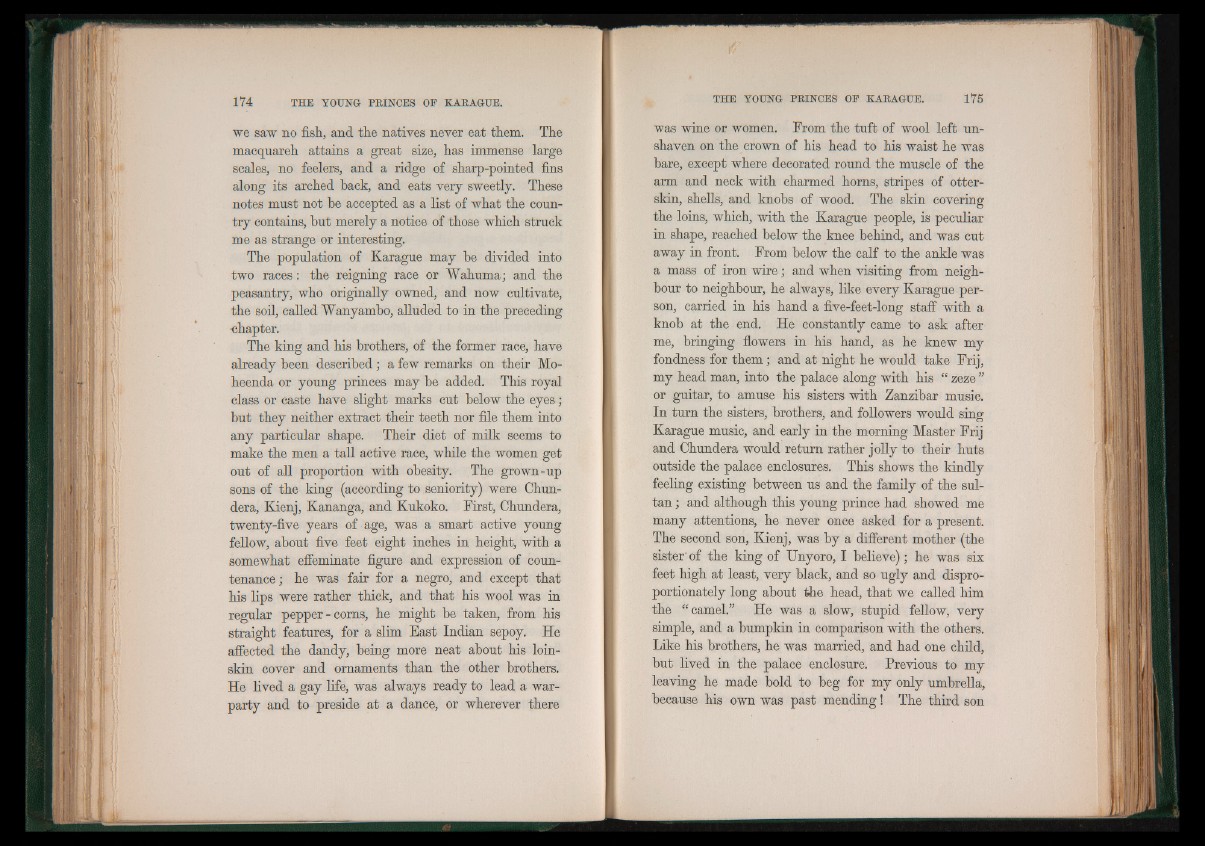
we saw no fish, and the natives never eat them. The
macquareh attains a great size, has immense large
scales, no feelers, and a ridge of sharp-pointed fins
along its arched hack, and eats very sweetly. These
notes mnst not be accepted as a list of what the country
contains, bnt merely a notice of those which struck
me as strange or interesting.
The population of Karague may be divided into
two races: the reigning race or Wahuma; and the
peasantry, who originally owned, and now cultivate,
the soil, called Wanyambo, alluded to in the preceding
•chapter.
The king and his brothers, of the former race, have
already been described; a few remarks on their Mo-
heenda or young princes may be added. This royal
class or caste have slight marks cut below the eyes;
but they neither extract their teeth nor file them into
any particular shape. Their diet of milk seems to
make the men a tall active race, while the women get
out of all proportion with obesity. The grown-up
sons of the king (according to seniority) were Chun-
dera, Kienj, Kananga, and Kukoko. First, Chundera,
twenty-five years of age, was a smart active young
fellow, about five feet eight inches in height, with a
somewhat effeminate figure and expression of countenance;
he was fair for a negro, and except that
his lips were rather thick, and that his wool was in
regular pepper - corns, he might be taken, from his
straight features, for a slim East Indian sepoy. He
affected the dandy, being more neat about his loin-
skin cover and ornaments than the other brothers.
He lived a gay life, was always ready to lead a war-
party and to preside at a dance, or wherever there
was wine or women. From the tuft of wool left unshaven
on the crown of his head to his waist he was
bare, except where decorated round the muscle of the
arm and neck with charmed horns, stripes of otter-
skin, shells, and knobs of wood. The skin covering
the loins, which, with the Karague people, is peculiar
in shape, reached below the knee behind, and was cut
away in front. From below the calf to the ankle was
a mass of iron wire; and when visiting from neighbour
to neighbour, he always, like every Karague person,
carried in his hand a five-feet-long staff with a
knob at the end. He constantly came to ask after
me, bringing flowers in his hand, as he knew my
fondness for them; and at night he would take Frij,
my head man, into the palace along with his “ zeze f
or guitar, to amuse his sisters with Zanzibar music.
In turn the sisters, brothers, and followers would sing
Karague music, and early in the morning Master Frij
and Chundera would return rather jolly to their huts
outside the palace enclosures. This shows the kindly
feeling existing between us and the family of the sultan
; and although this young prince had showed me
many attentions, he never once asked for a present.
The second son, Kienj, was by a different mother (the
sister' of the king of Unyoro, I believe); he was six
feet high at least, very black, and so ugly and disproportionately
long about the head, that we called bim
the “ camel.” He was a slow, stupid fellow, very
simple, and a bumpkin in comparison with the others.
Like his brothers, he was married, and had one child,
but lived in the palace enclosure. Previous to my
leaving he made bold to beg for my only umbrella,
because his own was past mending! The third son